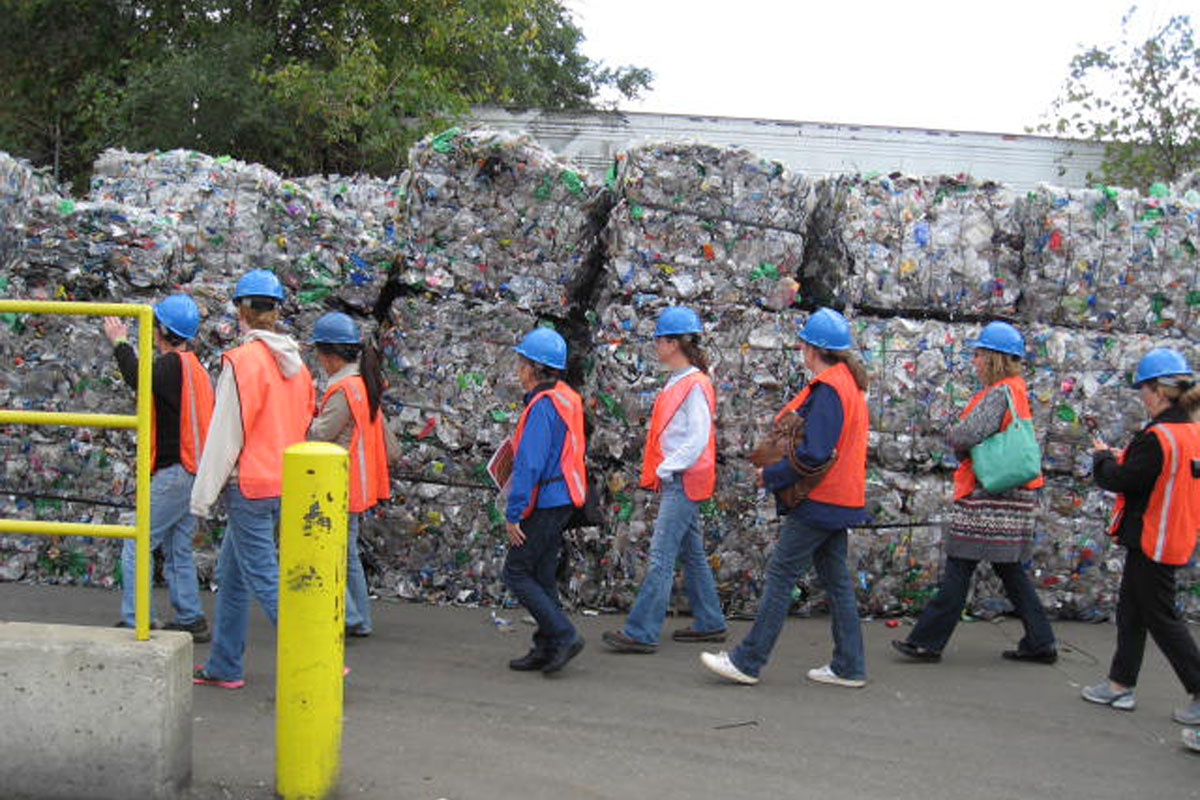As long as humans continue to destroy the environment, there will always be a need for conscientious individuals actively seeking to make a difference. Master Recyclers Sharon Angelina, Adele Szymanski, and Samantha Joll have integrated bettering their world into their daily lives.
Sharon Angelina grew up in Dyer, Indiana and attended Lake Central High School. She currently lives in Valparaiso and freelances as a pianist and also runs the Barn School of Art. Angelina has created environmental guidelines for the Art Barn and they hope to soon be officially registered as a green business.
Hailing from Hobart, Indiana, Adele Syzmanski attended Andrean High School and earned an Early Childhood Education degree from Purdue Calumet. She is a retired preschool teacher. This Porter resident hopes to leave the world a better place for her grandsons, and so she actively seeks out ways to be involved.
Westville Middle School teacher Samantha Joll finds joy in recycling. Joll grew up in Michigan City, Indiana and attended Rogers High School and Valparaiso University. She currently lives in Porter.
These three Master Recyclers have offered to share their lifelong experience and knowledge in the hopes that we together can work as a team to make our world a better one.
 What sparked your environmental consciousness?
What sparked your environmental consciousness?
“The lifelong knowledge that we are ruining the planet both through exhausting its resources and through pollution drew my attention to bettering our environment,” Angelina said. “Recycling is only a part of fixing that. The highest priority should be reuse of what we already have and reduction of unnecessary purchases that lead to unnecessary waste.”
“I really love recovering resources that the planet doesn’t need to be destroyed for,” Joll said.
“While attending Purdue, I remember having to present a persuasive speech and presenting it to my speech class. I tried to persuade my employer to buy my classroom a dishwasher, so we would not have to use Styrofoam plates, cups, or plastic utensils,” Szymanski said. “My visual was a large see-through garbage bag with a day's worth of 40 plates, 40 bowls, 40 glasses, and utensils etc. It was full and shocking. Plus, this was only one days’ worth, there were four more days, plus many other classrooms generating this obscene amount. My professor gave me an A and said I should get a dishwasher.
 Could you give a few examples of how you live eco-friendly on a daily basis?
Could you give a few examples of how you live eco-friendly on a daily basis?
“I live by simple lifestyle rules of shopping at resale, repurposing used items, and DIY making as much as possible rather than buying new,” Angelina said. “After all that, the waste produced in my house and business gets recycled carefully, and most food waste gets composted.”
“I compost and I recycle items at my school that others would usually throw away: metal scrap, old textbooks, caps for benches,” Joll said. “I upcycle items that would ordinarily make it to the trash.”
“I compost and add this to my garden. I recycle all cans, bottles, and plastic bags,” Szymanski said. “My curbside recycle bin is always full, not so much with my trash can. My friend lives in an apartment and we make sure her recyclables don't go in the trash, but instead, make it into my recycler. This involves me picking it up or she delivers it to my house.”
 How did you become a master recycler?
How did you become a master recycler?
“I heard about the program through a friend and signed up as soon as I could,” Angelina said. “There is a motto in the Environmental Movement, that basically you don't have to do anything heroic. It's just each individual creating simple, helpful habits and repeating them over and over that actually makes the biggest impact.”
“I noticed a recycling class being offered through Porter County Waste and Reuse and I signed up for it. One of the most appealing parts of the class was the field trips. We visited recycling facilities, a landfill, Pratt Industries, and Metro along with many other places,” Szymanski said. “After completing the class, we are expected to volunteer 30 hours in the community sharing our newly acquired knowledge. This is not difficult to do as there are many opportunities.
How do you think we as a community can improve our world together through recycling?
“Funding and continually educating the public, starting at the preschool level, would be a great start,” Szymanski said. “As an adult, I thought I was fairly informed, but I learned a lot from my recycling class and I am still learning.”
“It is important to become knowledgeable about recycling so that one can really make informed choices regarding purchases, recycling items, and helping others gain more knowledge about the recycling process,” Joll said. “It creates less waste in the environment and if more people become passionate and advocate for it, companies will do a better job of using packaging that is easily recyclable. This will create green jobs as well as lessen the impact waste has on our lives.”
“Education is key. If people don't know why and how to reduce, and what materials are recyclable, the overall problem isn't going to budge. People need to have the knowledge, and they also need to have the reasons why it makes a difference. Why it matters,” Angelina said. “At the end of the day, people need solid reasons before it will become important to them. A good educational program encompasses motivation as well as information.”
“As long as we continue to consume items that could potentially damage the planet, we have a responsibility to know how to deal with that waste,” Angelina continued. “It cannot be ignored any longer. We need leaders in this movement.”
The next Master Recycler class will start Sept. 13 and is open to anyone who lives or works in Porter County. Details and registration information are available on www.PorterCountyRecycling.org.
